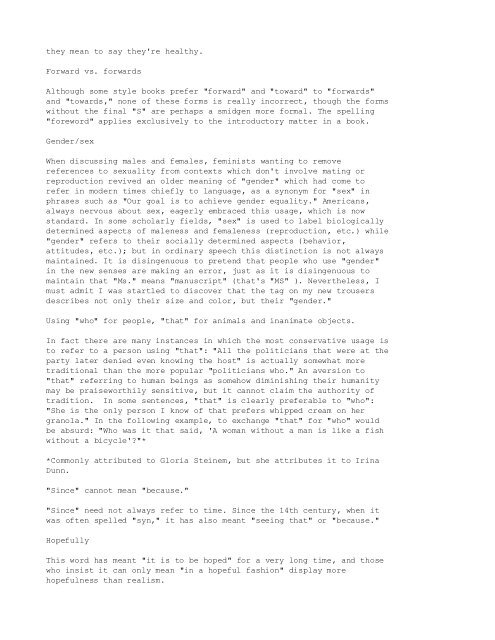Common_Errors_in_English_usage
Common_Errors_in_English_usage
Common_Errors_in_English_usage
You also want an ePaper? Increase the reach of your titles
YUMPU automatically turns print PDFs into web optimized ePapers that Google loves.
they mean to say they're healthy.<br />
Forward vs. forwards<br />
Although some style books prefer "forward" and "toward" to "forwards"<br />
and "towards," none of these forms is really <strong>in</strong>correct, though the forms<br />
without the f<strong>in</strong>al "S" are perhaps a smidgen more formal. The spell<strong>in</strong>g<br />
"foreword" applies exclusively to the <strong>in</strong>troductory matter <strong>in</strong> a book.<br />
Gender/sex<br />
When discuss<strong>in</strong>g males and females, fem<strong>in</strong>ists want<strong>in</strong>g to remove<br />
references to sexuality from contexts which don't <strong>in</strong>volve mat<strong>in</strong>g or<br />
reproduction revived an older mean<strong>in</strong>g of "gender" which had come to<br />
refer <strong>in</strong> modern times chiefly to language, as a synonym for "sex" <strong>in</strong><br />
phrases such as "Our goal is to achieve gender equality." Americans,<br />
always nervous about sex, eagerly embraced this <strong>usage</strong>, which is now<br />
standard. In some scholarly fields, "sex" is used to label biologically<br />
determ<strong>in</strong>ed aspects of maleness and femaleness (reproduction, etc.) while<br />
"gender" refers to their socially determ<strong>in</strong>ed aspects (behavior,<br />
attitudes, etc.); but <strong>in</strong> ord<strong>in</strong>ary speech this dist<strong>in</strong>ction is not always<br />
ma<strong>in</strong>ta<strong>in</strong>ed. It is dis<strong>in</strong>genuous to pretend that people who use "gender"<br />
<strong>in</strong> the new senses are mak<strong>in</strong>g an error, just as it is dis<strong>in</strong>genuous to<br />
ma<strong>in</strong>ta<strong>in</strong> that "Ms." means "manuscript" (that's "MS" ). Nevertheless, I<br />
must admit I was startled to discover that the tag on my new trousers<br />
describes not only their size and color, but their "gender."<br />
Us<strong>in</strong>g "who" for people, "that" for animals and <strong>in</strong>animate objects.<br />
In fact there are many <strong>in</strong>stances <strong>in</strong> which the most conservative <strong>usage</strong> is<br />
to refer to a person us<strong>in</strong>g "that": "All the politicians that were at the<br />
party later denied even know<strong>in</strong>g the host" is actually somewhat more<br />
traditional than the more popular "politicians who." An aversion to<br />
"that" referr<strong>in</strong>g to human be<strong>in</strong>gs as somehow dim<strong>in</strong>ish<strong>in</strong>g their humanity<br />
may be praiseworthily sensitive, but it cannot claim the authority of<br />
tradition. In some sentences, "that" is clearly preferable to "who":<br />
"She is the only person I know of that prefers whipped cream on her<br />
granola." In the follow<strong>in</strong>g example, to exchange "that" for "who" would<br />
be absurd: "Who was it that said, 'A woman without a man is like a fish<br />
without a bicycle'?"*<br />
*<strong>Common</strong>ly attributed to Gloria Ste<strong>in</strong>em, but she attributes it to Ir<strong>in</strong>a<br />
Dunn.<br />
"S<strong>in</strong>ce" cannot mean "because."<br />
"S<strong>in</strong>ce" need not always refer to time. S<strong>in</strong>ce the 14th century, when it<br />
was often spelled "syn," it has also meant "see<strong>in</strong>g that" or "because."<br />
Hopefully<br />
This word has meant "it is to be hoped" for a very long time, and those<br />
who <strong>in</strong>sist it can only mean "<strong>in</strong> a hopeful fashion" display more<br />
hopefulness than realism.





